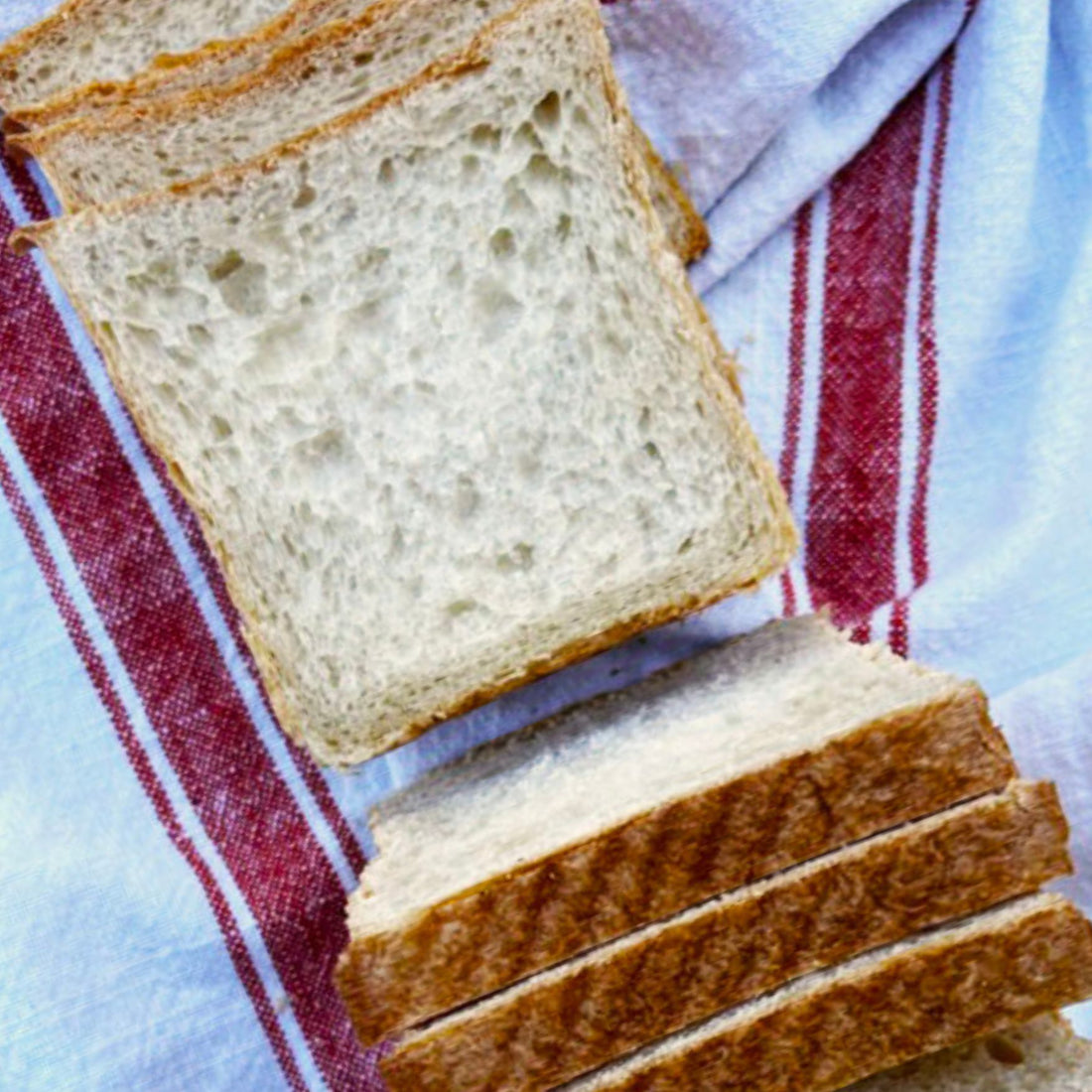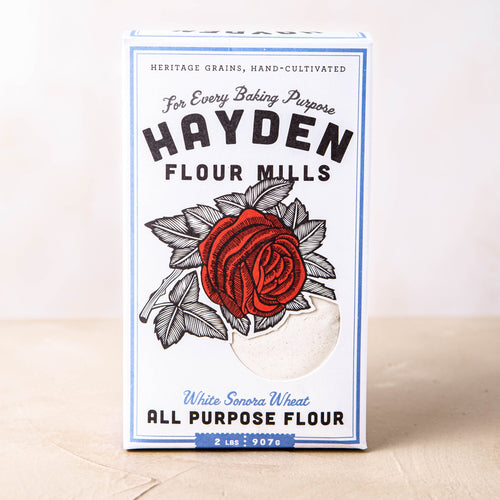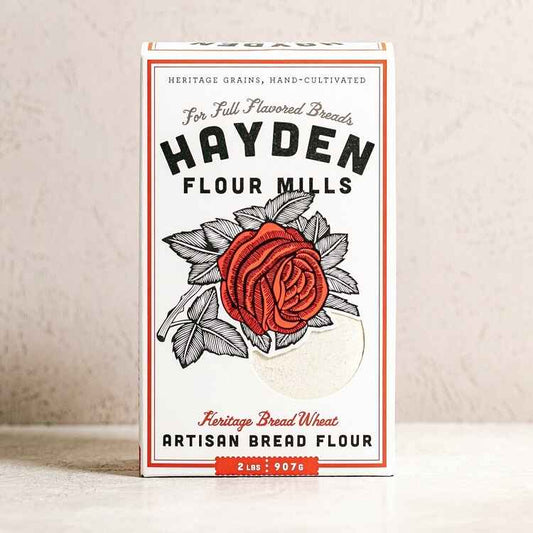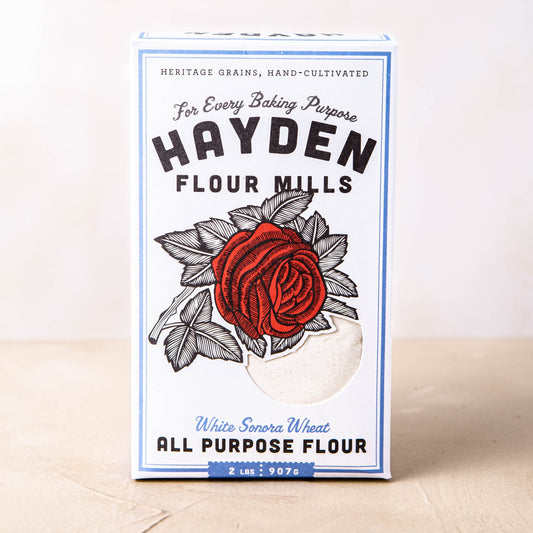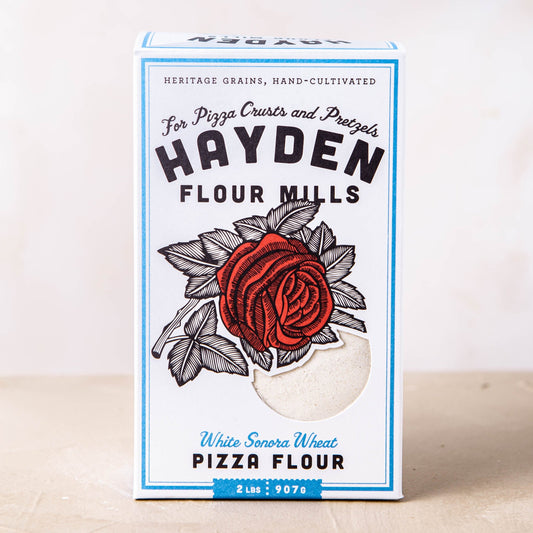What You'll Need
Tools
Electric Mixer with dough hook attachment
Kitchen Scale
Mixing Bowl
Dough Scraper
Dough Whisk
(2) Pullman Loaf Pans with lids (9x5) (or you can use 9 x 5 tin loaf pans without lids for a rounded top)
Levain
30 grams bubbly starter
100 grams Artisan Bread Flour
50 grams water
15 grams white sugar
Autolyse
850 grams All Purpose Flour
552 grams whole milk
Slurry
Levain (from above)
17 grams salt
150 grams whole egg (3 eggs)
68 grams honey
Add-in
113 grams unsalted butter
Directions
Desired dough temperature: 78°F
Prepare the levain (8:00 am)
Mix levain ingredients in a jar and leave them covered at a warm temperature, 74-76 F, to ripen for 5 hours.
Autolyse (12:00 pm)
Add warm water to the Autolyse so that the temperature of the mixed dough meets the FDT (final dough temperature) of 78 degrees F for the recipe.
Place the autolyse ingredients in a bowl and mix by hand. Use a dough whisk or wet hands to mix until no dry bits remain. The dough will be shaggy and loose. Use a scraper to scrape down the sides of the bowl to keep all the dough in one area at the bottom. Cover the bowl and place near your levain for one hour.
Mix Dough (1:00 pm)
In a small separate bowl, thoroughly mix together the slurry ingredients. Set aside.
To the bowl of an electric mixer fitted with a dough hook attachment, add in the autolyse and the slurry. With the mixer on low mix for 3-4 minutes or until the dough is fully mixed. Leaving the dough in the mixer, cover with a damp tea towel and let rest for 15 minutes.
Meanwhile pull the butter out of the refrigerator. On a clean cutting board cube the butter and let sit for 10 minutes to warm to room temperature. Once the butter is soft enough to squeeze between your fingers, turn the electric mixer back on and slowly little by little add the butter. This should take about 5 minutes. Once a shiny, soft looking dough is achieved, turn mixer off.
Bulk Fermentation (1:15 pm - 4:15 pm)
At a warm room temperature, 74-76 degrees F (23-25 C), bulk fermentation should take about 3 hours.
This dough will require 4 sets of stretches and folds during bulk fermentation. After the first 30 minutes, wet your hands, grab one side of the dough, and lift it up and over to the other side. Rotate the bowl 180 degrees and repeat. Then rotate the bowl a quarter turn and stretch and fold that side. Rotate the bowl 180 degrees again and finish with a stretch and fold on the last side. The dough should be neatly folded up in the bowl.
Cover and repeat these folds 3 more times, at 30 minute intervals.
Then let the dough rest, covered, for the remainder of bulk fermentation.
Divide and preshape (4:15 pm)
After 3 hours, the dough should have risen by roughly 30% and should look puffy to the touch. If your dough isn’t puffy, continue the bulk fermentation for another 30 minutes, checking frequently.
Scrape the dough onto a clean counter. Divide the dough into 2 equal pieces and pre-shape the dough into rounds, pulling the rounds doughs toward your body to build tension.
Let the dough rest, covered with a damp tea towel for 30 minutes.
Shape (4:45 pm)
Butter the 2 pullman loaf pans and lids. To create the perfectly square loaf, use a pullman loaf pan with lids.
Flour the top of the reshaped rounds and your work surface. Using your bench scraper, flip one of the rounds over onto the floured area. Using floured hands, shape the dough into a Swiss roll shape. Gently transfer the loaf into a well buttered pan seam side down. Repeat with the second loaf. Slide the buttered lid over the top.
Final Proofing (5:00 pm - 6:30 pm)
Set lidded loaf pans in kitchen for 90 minutes to proof at room temperature.
Cold Fermentation (6:30 pm - 8:00 am)
Place lidded loaf pans in refrigerator for overnight cold fermentation.
Bake (next day, 8:00 am - 9:30 am)
Place the oven rack in the bottom-third of the oven.
Pre-heat the oven to 350 F (176 C).
Place both Tin Loafs in oven. Bake at 350 F/ 176 C for 45 minutes. Remove from the oven, remove breads from Tins and place on cooling rack. Let completely cool before slicing.
Share and enjoy!
Makes two loaves.
Recipe contributed by A Sourdough Story

